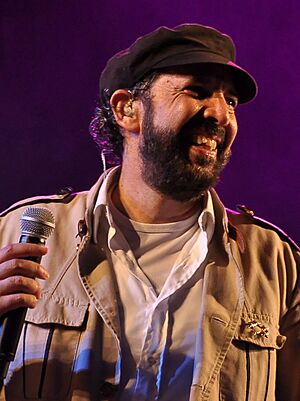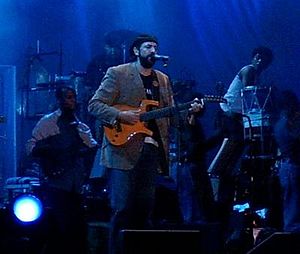Juan Luis Guerra facts for kids
Quick facts for kids
Juan Luis Guerra
|
|
|---|---|

Guerra, Santo Domingo, 2012
|
|
| Born |
Juan Luis Guerra Seijas
7 June 1957 Santo Domingo, Dominican Republic
|
| Alma mater | Berklee College of Music |
| Occupation |
|
| Years active | 1983–present |
| Title | Juan Luis Guerra |
| Spouse(s) |
Nora Clementina Altagracia Vega Rasuk
(m. 1983) |
| Children | 2 |
| Awards | Full list |
| Musical career | |
| Genres |
|
| Instruments |
|
| Labels |
|
| Associated acts | Juanes |
Juan Luis Guerra Seijas, born on June 7, 1957, is a famous musician, singer, songwriter, and music producer from the Dominican Republic. He has won many awards for his music, including 31 Latin Grammy Awards and three Grammy Awards. He has sold over 15 million records around the world, making him one of the top-selling Latin music artists.
Guerra is known worldwide for his unique music style. He mixes merengue and Latin sounds, which has made him very popular across Latin America. He also helped make bachata music famous globally. His bachata style often includes traditional bolero rhythms and melodies inspired by bossa nova. Juan Luis Guerra enjoys trying different music styles. His songs feature many rhythms like merengue, bachata, bolero, balada, salsa, pop, rock and roll, reggae, jazz, and religious music. One of his most famous songs is Ojalá Que Llueva Café.
Contents
Early Life and Education
Juan Luis Guerra Seijas was born to Gilberto Guerra Pacheco and Olga Seijas Herrero. He has two brothers, José Gilberto and Diego Esteban. As a student, he loved sports. Before becoming a musician, Guerra studied Philosophy and Literature at the Universidad Autónoma de Santo Domingo.
He then started studying guitar and music theory at the National Conservatory of Music in Santo Domingo. Later, he moved to the United States to attend the Berklee College of Music in Boston. He graduated in 1982 with a degree in jazz composition. After finishing his studies, he returned to the Dominican Republic and started a band with local musicians.
Music Career
Starting Out in the 1980s
In 1984, Juan Luis Guerra released his first album, Soplando. He formed a band with local musicians called Juan Luis Guerra y 440. The number "440" refers to the musical tuning standard A440. Guerra said his first album was based on jazz ideas from Berklee and was not meant to be a big hit. However, he soon began writing more merengues.
In 1983, a Dominican businessman named Bienvenido Rodríguez signed Juan Luis Guerra to Karen Records. This changed Guerra's music style to focus more on merengue. He recorded two albums during this time: Mudanza y Acarreo (1985) and Mientras Más Lo Pienso...Tú (1987). These albums became more popular.
In 1988, while recording the album Ojalá Que Llueva Café, Guerra became the main singer for 440. This album helped him become known internationally. Its sales topped music charts in many Latin American countries.
Success in the 1990s
In 1990, 440 released Bachata Rosa. This album was a huge success and earned Guerra his first Grammy award. It sold over five million copies, allowing Guerra to tour in Latin America, the U.S., and Europe. The album features popular love songs like "Burbujas de amor" (Bubbles of Love) and "Bachata Rosa."
In 1992, Guerra released Areíto. This album included the hit song "El costo de la vida" (The Cost of Life). This song talked about problems like corruption and rising living costs in Latin America. Other songs on the album also discussed social issues in Latin American countries. "El costo de la vida" was his first song to reach number one on the Hot Latin Tracks chart.
His next album, Fogaraté (1994), focused on traditional Dominican music styles, like Perico Ripiao.
In 1998, Guerra released Ni es lo mismo ni es igual (Neither The Same Nor Equal). This album won three Latin Grammys in 2000. Its popular songs included "Mi PC" (My PC), "Palomita Blanca" (Little White Dove), and "El Niágara en Bicicleta" (The Niagara on Bicycle).
2000s and Beyond
In 2004, Guerra released Para Tí (For You), his first new album in six years. Many songs on this album were Christian. It quickly became number one on the US Top Latin Albums chart. The album sold half a million copies worldwide and won two awards at the 2005 Billboard Music Awards. The song "Las Avispas" (The Wasps) won both Gospel-Pop and Tropical-Merengue categories. Guerra also received the Spirit of Hope Award for his charity work.
In 2006, Guerra performed at Berklee's 60th anniversary. He also recorded songs with other artists like Diego Torres and Maná. In April 2006, he was honored as a BMI Icon for his songwriting.
Guerra set records when he opened for The Rolling Stones' A Bigger Bang Tour in Puerto Rico in February 2006. He was also invited by Sting to sing with him in the Dominican Republic.
In 2007, Guerra received a lifetime achievement award at the Premio Lo Nuestro awards. He also released his new album, "La Llave De Mi Corazón" (The Key to My Heart). This album won over 20 awards, including 5 Latin Grammy Awards and a Grammy Award. At the Latin Grammy Awards that year, he won in every category he was nominated for, including Record of the Year and Album of the Year. He also received the Latin Recording Academy Person of the Year Award for his music and charity work.
In March 2008, Guerra won 6 awards at the Premios Casandra, a major award event in the Dominican Republic. In September 2008, UNESCO named Guerra an Artist for Peace. This was to recognize his work helping children with disabilities and those in need. In May 2009, his old school, Berklee College of Music, gave him an honorary doctorate degree.
2010s and Recent Work
In April 2010, Guerra released the music video for his new song "Bachata en Fukuoka." In June 2010, he released the album A son de Guerra, which featured eight different music rhythms. The album included collaborations with artists like Juanes. The first song from this album, "Bachata en Fukuoka," quickly reached number one on several Billboard charts.
In January 2012, the video for his song "En el cielo no hay Hospital" (There's no Hospital in Heaven) was released. This song was part of his album "Colección Cristiana." Later that year, he worked with Spanish singer Miguel Bosé on the song "Yo creo en Ti."
In April 2014, "Tus Besos" was released. It was a bachata song with a music video inspired by 1950s rock and roll. His son, Jean Gabriel, directed this video.
In 2019, during the Carnival of Santa Cruz de Tenerife in Spain, Juan Luis Guerra set a new record. He gathered over 400,000 people for a concert in an open-air plaza, which was the largest crowd for such an event at that time.
Singing in Other Languages
Juan Luis Guerra has recorded songs in English, such as "July 19th" and "Medicine for My Soul." Some of his songs mix English and Spanish, like "Woman del Callao" and "La Llave de Mi Corazón." His album Areíto included songs sung in the Arawak language of the ancient Taíno people. He also recorded the album "Bachata Rosa" in Portuguese. His song "Bachata en Fukuoka" even uses Japanese words.
Songwriting for Other Artists
Juan Luis Guerra has also written songs for other artists. In 1988, he wrote music for Dominican musician Taty Salas. He also composed songs for Mexican singers like Emmanuel and Luis Miguel. In 1994, he wrote "Te Propongo" for Puerto Rican salsa singer Gilberto Santa Rosa.
Lyrical Style
Because he is from the Dominican Republic, Juan Luis Guerra's music is strongly influenced by Caribbean rhythms like merengue and bachata.
His song lyrics often use simple, yet meaningful, language and metaphors. For example, "Burbujas de Amor" (Bubbles of Love) is a well-known song. His lyrics also talk about social issues from a human point of view. For instance, "Visa Para un Sueño" (Visa for a Dream) is about the challenges people face when trying to visit America. "El Niágara en Bicicleta" describes problems in social health services. "El Costo de La Vida" talks about how global changes and government actions affect everyday people.
Discography
- Soplando (1984)
- Mudanza y Acarreo (1985)
- Mientras Más Lo Pienso...Tú (1987)
- Ojalá Que Llueva Café (1989)
- Bachata Rosa (1990)
- Areíto (1992)
- Fogaraté (1994)
- Ni es lo mismo ni es igual (1998)
- Para Ti (2004)
- La Llave de Mi Corazón (2007)
- A Son de Guerra (2010)
- Colección Cristiana (2012)
- Todo Tiene Su Hora (2014)
- Literal (2019)
- Privé (2020)
- Radio Güira (2023)
Tours
- Ojala Que Llueva Cafe Tour (1990–91)
- Bachata Rosa World Tour (1991–92)
- Areito World Tour (1993)
- Tour 20 años (2004–06)
- La Travesia Tour (2008–09)
- A Son de Guerra World Tour (2011–13)
- Todo Tiene Su Hora Tour (2015–17)
- Literal Tour Grandes Éxitos (2019)
- Entre Mar y Palmeras Tour (2022-24)
Awards and Nominations
440 Band Members
- Janina Rosado
- Roger Zayas-Bazán
- Maridalia Hernández
- Mariela Mercado
- Marco Hernández
- Adalgisa Pantaleón
- Quico Rizek
Personal Life
Juan Luis Guerra is married to Nora Clementina Altagracia Vega Rasuk. They have two children. His wife is the aunt of Miss Universe 2003 Amelia Vega Polanco.
In 2000, he became an evangelical Christian and a worship leader at the “Más Que Vencedores” church in Santo Domingo.
In October 2008, he became a Goodwill Ambassador for UNESCO. He participated in an event to help fight poverty and work towards global development goals.
In April 2010, he organized a concert to raise money for people affected by the 2010 Haiti earthquake. Thanks to this successful event, a children's hospital was later built in Haiti.
See also
 In Spanish: Juan Luis Guerra para niños
In Spanish: Juan Luis Guerra para niños
- List of best-selling Latin music artists
 | William Lucy |
 | Charles Hayes |
 | Cleveland Robinson |


